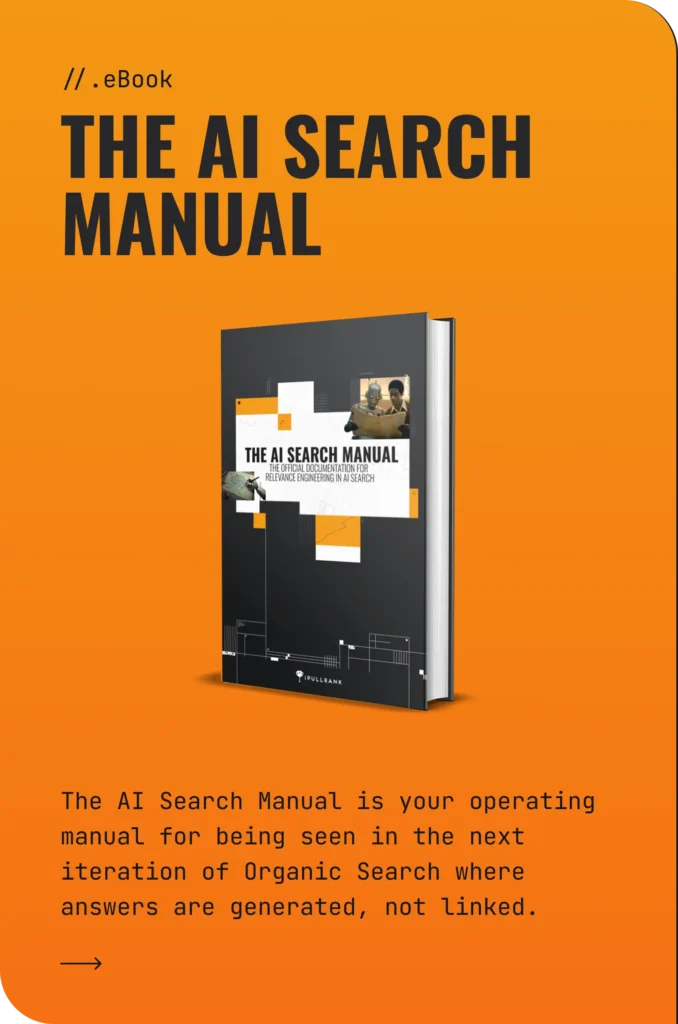Conferences are so back, folks. For the first time in five years, SMX met in person in Boston and it was packed. There were standing-room-only sessions, lots of trudging through crowded halls like a herd of cattle, and not a free power outlet to be found.
SMX didn’t disappoint and I was thrilled to have agreed with pretty much every presentation I heard. Whether the name was used or not, Relevance Engineering is everywhere in search now and its foundation was definitely sprinkled throughout SMX.
So many of the sessions were hopeful and exciting and made me feel like I was traveling with the speakers on board a speeding locomotive gliding through the countryside (sorry, I’m on a train home from Boston as I’m writing this).
Other sessions talking about things like agentic search were a bit overwhelming and disorienting, like I was trying to find a seat on a train while it’s moving (okay, I’ll stop with the trains).
I watched every session of the SEO track at SMX Advanced 2025. From branding and user experience to vector embeddings and content relevance, my neck started to hurt from nodding my head so much.
Here’s a rundown of what I heard through the lens of Relevance Engineering (r19g) and how it’s all going to impact the future of search.
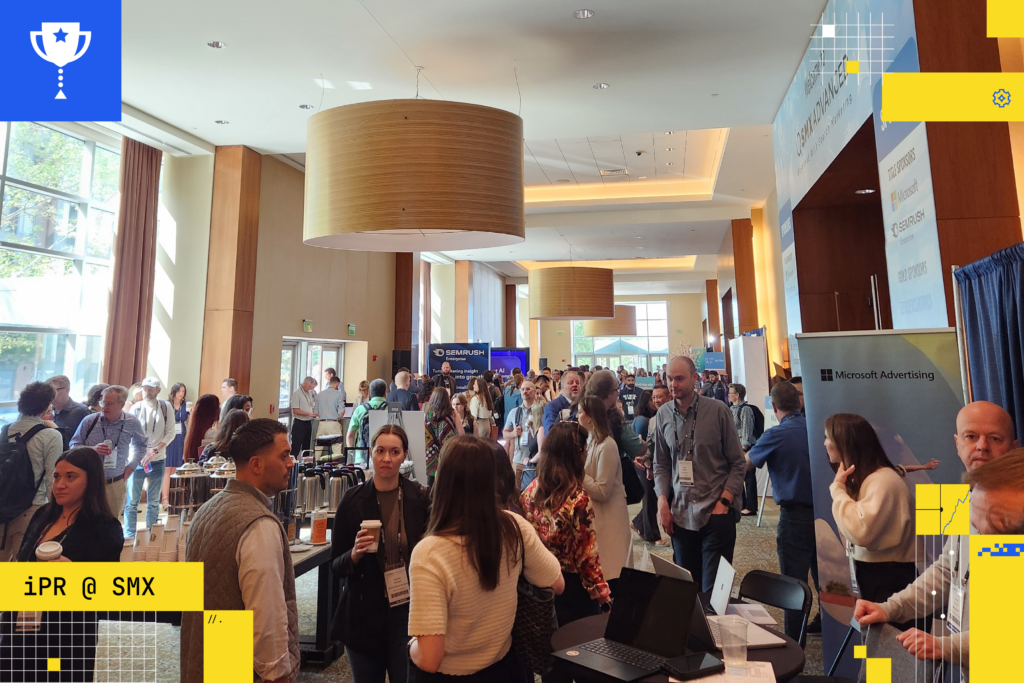
SMX Keynote Presentation on SEO and PPC
The day kicked off with a keynote from one of my favorite speakers of all time (aside from my boss Mike King, of course), Seer Interactive CEO Wil Reynolds. His presentation, “How to Use SEO and PPC Data Together to Create Wins in Search, Social and AI,” took us through the current digital environment and how it’s now possible to have SEO wins but not actually help the people doing the searching.
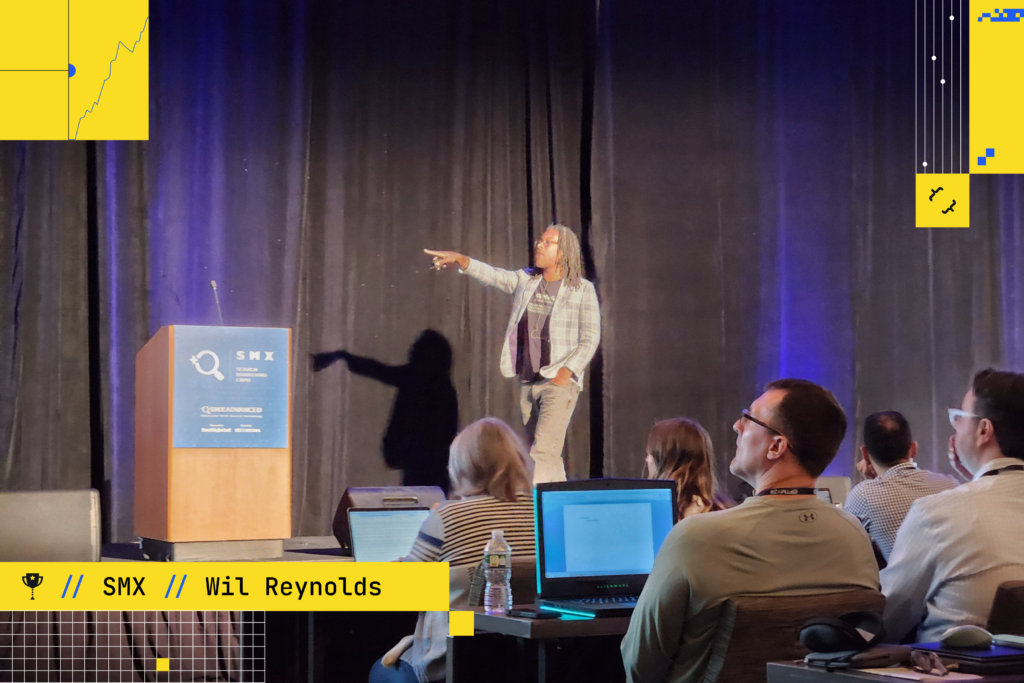
“When you write stuff people love you get the bonus of distribution.”
- Wil Reynolds
Key Points
- The web is stuffed with bad content: Wil has been expounding the virtues of combining SEO and PPC data for 10 years yet you won’t see his name on any of those popular “top 10” listicles that keep popping up in LLM results (probably because he hasn’t made one himself yet that includes Seer!) but the point is, what’s showing up in results but might not be helpful to the user.
- To understand humans is to understand their prompts: We have to look deeper into how people are searching and what words are being used.
- Offset your loss of traffic with actual humans: If you do it right and don’t focus too much on algorithms, you can make up for your loss of traffic with searchers actually using your content and allowing it to disseminate naturally.
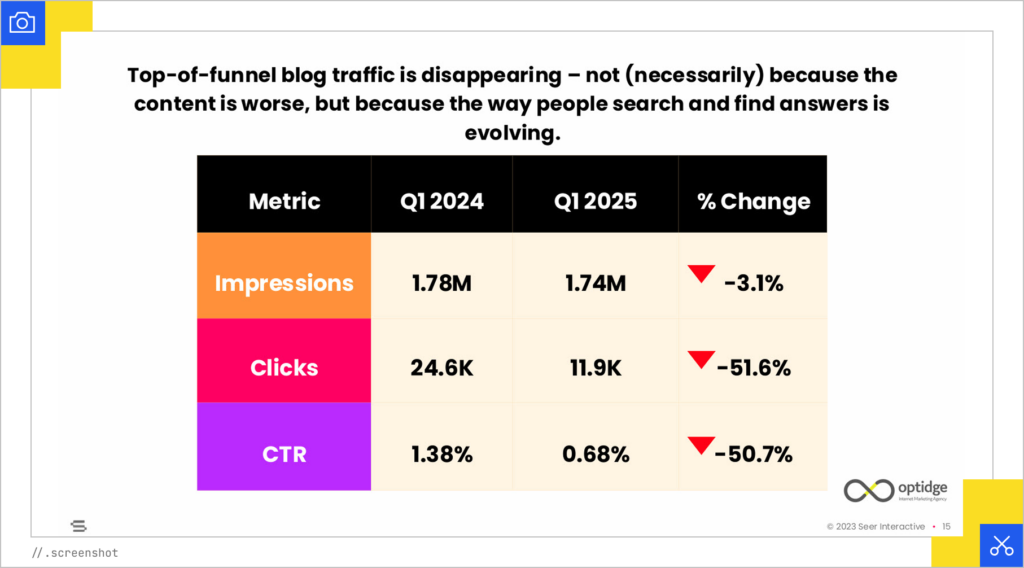
Relevance Engineering by Mike King
“It’s not just you, everybody’s traffic is going down right now.”
Even sites with the best content on the web are seeing clicks drop today as a direct result of AI Overviews and Mike King’s talk on r19g, “The End of SEO As We Know It,” provided some insight into the future of search.
Google is solving for something deeper. They want to reduce the cognitive load of search (its “Delphic Cost”), keeping users there longer. Mike said that search has become more probabilistic (varied) than deterministic (fixed). It will not always return the same result, and that means marketers have far less control than they used to.
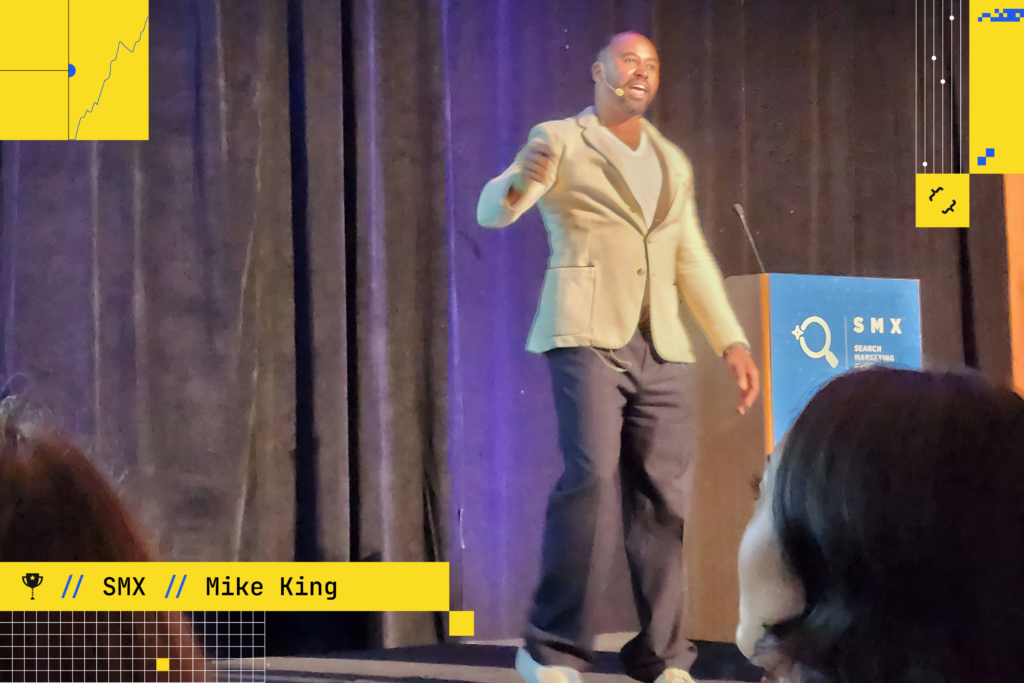
“It’s a dramatically different way that people are using the internet.”
- Mike King
Key Points
- The SEO industry is unprepared for AI search: SEO software is still built for lexical search rather than semantic search, which is based on vector embeddings at the passage level, so it’s no longer useful.
- Your SEO agency is probably not ready either: Simple rank tracking offers very little value in this new world. Mike introduced his new tool called Qforia, which helps you track related queries that LLMs might use to retrieve more documents so you can fill content gaps.
- Instead of reacting with fear, take ownership of the moment: This is an opportunity for those willing to rethink how they approach visibility and relevance.
- Search is a brand channel: The SERP has always been a place where users learn, not just click. That is more true now than ever thanks to fewer clicks, so make sure your brand is well represented.
As Mike says, we are no longer optimizing. We are engineering. That means:
- Breaking content into semantic chunks
- Embracing topical clustering
- Diversifying content formats
- Developing unique and helpful data and content
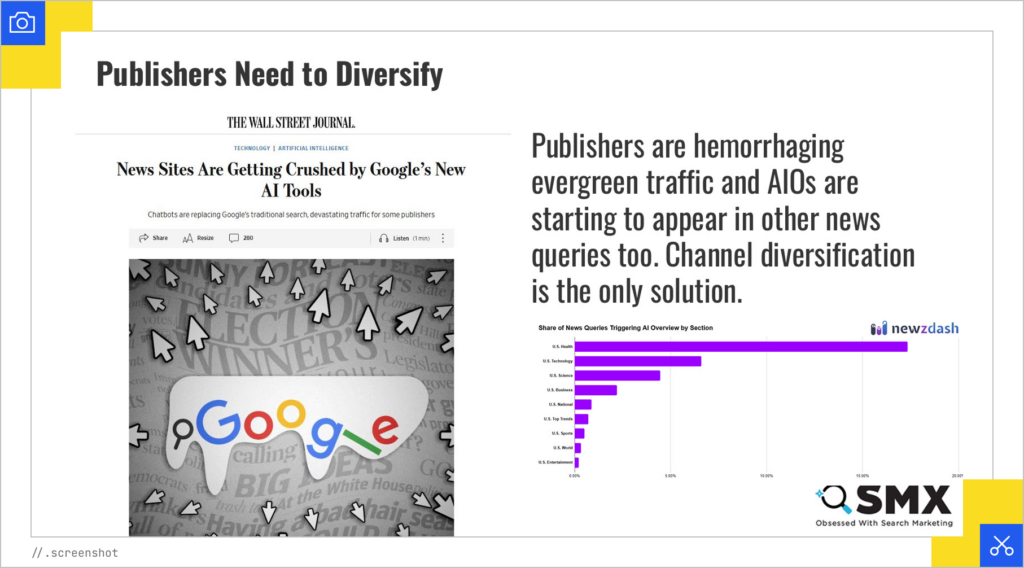
The main elements of Relevance Engineering were everywhere at SMX (and you can read even more about it on our site), but let’s look at how the rest of the SEO talks embodied the tenets of r19g:
- Digital PR
- Content strategy
- User experience
- Information retrieval
- Artificial intelligence
Digital PR and Branding
Mordy Oberstein, founder of Unity Brand Marketing, pointed out that despite endless content production across every vertical, the web isn’t growing. It’s constricting. His presentation, “Google Algorithm Updates in 2025: How to Deal with Relentless Rank Volatility,” covered branding, user behavior, ranking volatility, and like 97 photos of Barry Schwartz for some reason.
He pointed to rising volatility across search tools in Q1 of 2025. After core updates, nearly 10% of URLs appearing in the top 10 had not even ranked in the top 20 previously. That kind of movement doesn’t align with past behavior. The entire algorithm seems to have shifted.
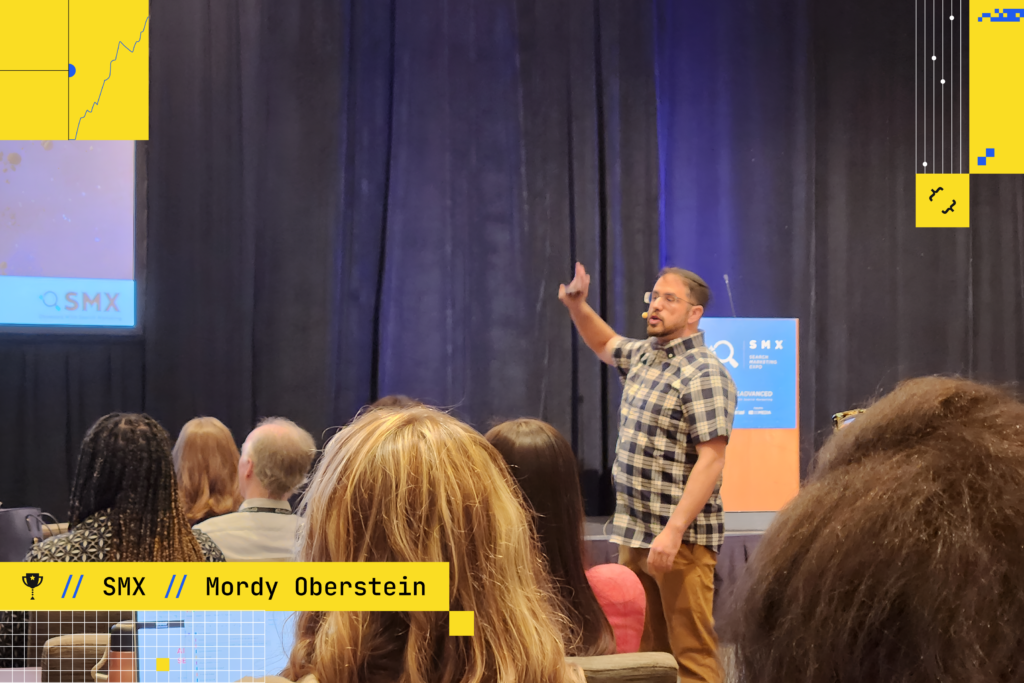
“Brand is the silent killer of performance.”
- Mordy Oberstein
Key Points
- Since the pandemic, key user behavior metrics have declined: Time on site has dropped from 10 minutes to 7. People view fewer pages. They are no longer browsing the web broadly. Instead, they interact within narrow, specific brand ecosystems.
- Fewer new websites are breaking into rankings: Between 2022 and 2024, the number of new domains reaching Google’s front page dropped sharply. The web is not just stagnating but getting smaller, too. And yet, content production continues to surge, flooding the internet with material that users don’t engage with.
- If your brand isn’t aligned with your audience, no amount of SEO will fix it: The magazine “Rolling Stone” was one example. Its traffic is declining not just because of SEO shifts but because it no longer resonates with its core audience. SEO tactics can’t help that.
Mordy said it’s not just about presence but the right presence. The internet is filled with noise and most of it is irrelevant to users. The brands that win will be the ones that stay aligned, authentic, and strategic.
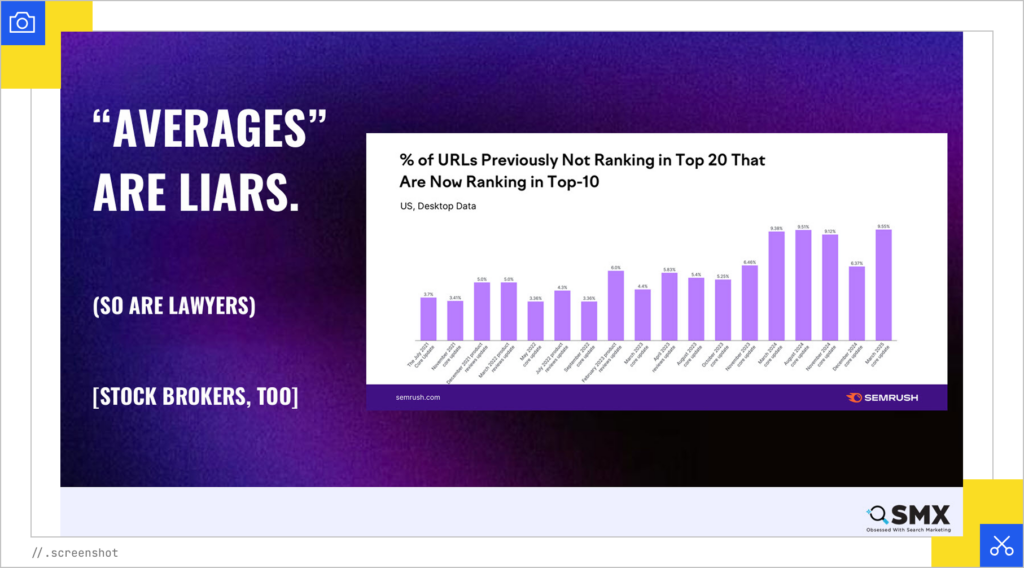
Content Strategy
Eric Enge, President of Pilot Holding, brought us back to some classic SEO tactics and how many of them still apply today in his presentation, “Google, EEAT, and Brand: Focusing on signals that actually Fuel SEO Growth.”
To anyone still treating SEO like a checklist: relevance is everything. User engagement is often supported by foundational SEO elements like accessibility, core web vitals, mobile usability, and smart information architecture, but you cannot rank for anything if your content isn’t relevant (which is the main message behind Relevance Engineering).
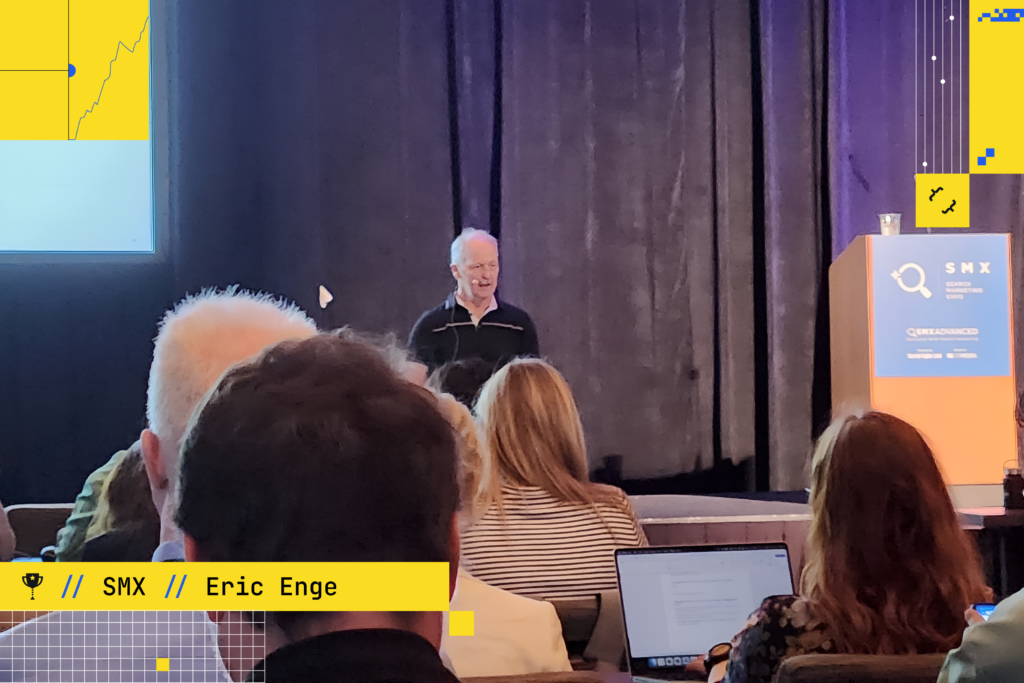
“Relevance is fundamental to ranking.”
- Eric Enge
Key Points
- Modern search engines use transformer models to assign meaning to words and phrases, then calculate how closely related they are to a topic using cosine similarity: This is how Google determines if your page deserves to rank. It’s not just about what you say, but how well your content matches the searcher’s intent on a semantic level.
- Pages ranking in positions 1 and 2 had significantly higher embedding relevance scores than lower-ranking results: To succeed in this system, you need to reverse-engineer relevance. Score your pages against the queries you want to rank for. Optimize based on semantic match, not just keyword usage.
- User engagement still matters: If people interact positively with a document, that sends a strong signal. If they bounce or leave quickly, that’s a red flag. Eric advocated for content pruning and removing pages with low engagement to improve overall site quality.
- Google wants us to be focused: If your site tries to cover too many unrelated topics, you will dilute your authority. In content fusion, embeddings are used to blend content more intelligently and increase relevance. This goes beyond just tagging authors. It’s about building a recognizable brand around the author, which encourages repeat visits and builds trust.
If your site knows what it stands for and creates content with semantic clarity and real user value, you will build lasting relevance.
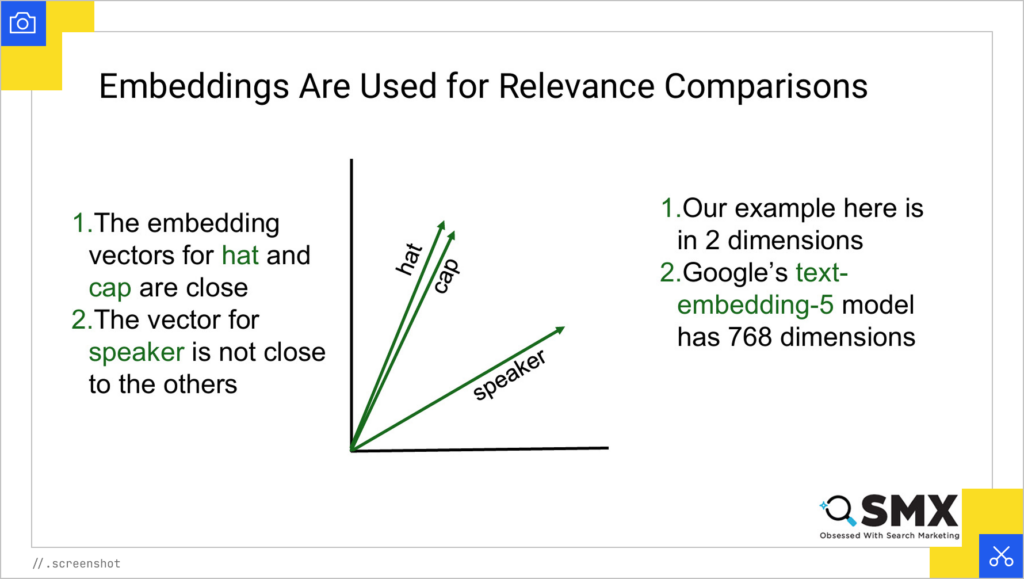
James Brockbank, Managing Director and Founder of Digitaloft, thinks that SEOs are still clinging to outdated link-building tactics and wasting money in the process. His presentation, “Measuring Link Relevance Using Vector Embeddings and Cosine Similarity,” pointed out that we’ve been conditioned to chase authority, volume, and domain ratings, but what Google actually cares about is topical relevance, and more specifically, how links support a page’s contextual understanding.
Most SEOs and link builders truly don’t take the time to learn how Google really works, but now there’s no excuse because we’ve acquired so much more insider knowledge than we once knew.
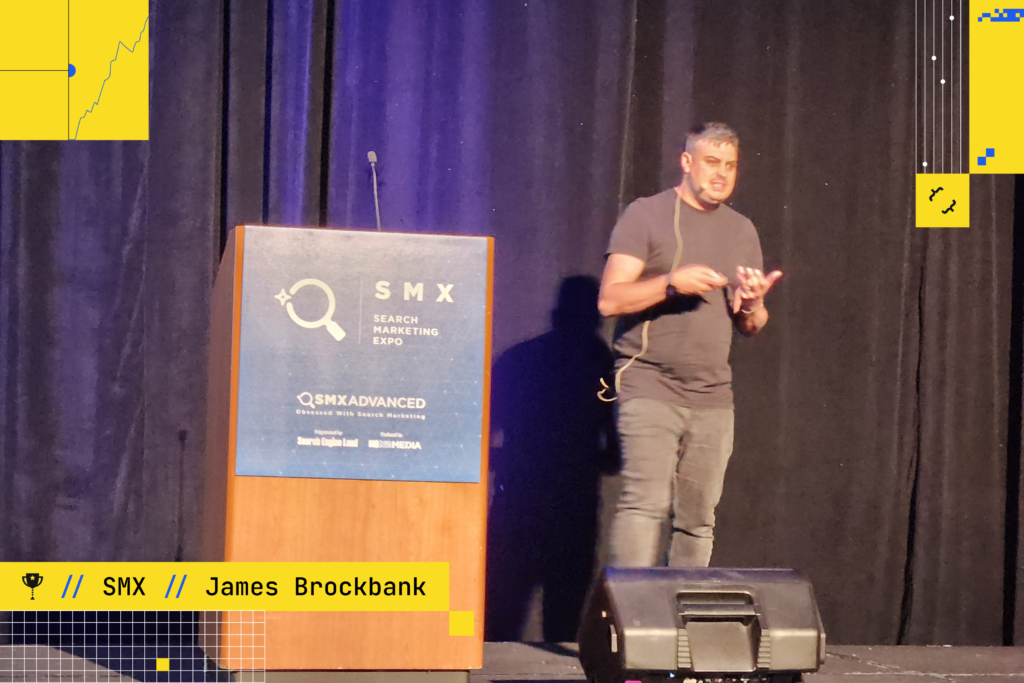
“We have more insights than ever before on how Google works.”
- James Brockbank
Key Points
- If your links point to pages that aren’t tightly aligned to the topic, they’ll be ignored and your page possibly demoted: Irrelevant links, even from high-authority domains, can actually suppress your rankings. Don’t waste your money. Focus on earning fewer, more relevant links that align to the topics you’re trying to win.
- Google uses three layers of embeddings that matter for ranking:
- Query embeddings: Individual queries and keyword clusters
- Content embeddings: Individual pages, subfolder, and entire site
- Link profile embeddings: Individual links, subfolder links, and link profile
- The BERT update was a turning point: It marked the shift from keyword matching to semantic understanding, yet many SEOs never updated their approach.
SEO needs to evolve past what worked a decade ago. Focus on alignment and context for relevance, and measure it with vector embeddings. Relevance used to be subjective, but vector embeddings and cosine similarity help make link relevance analysis an objective data point that can be measured.
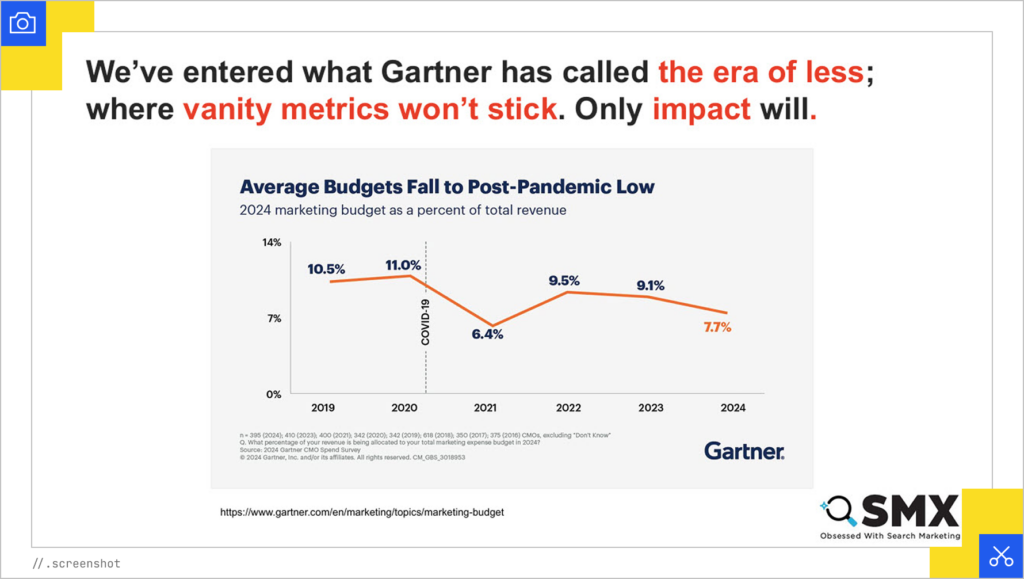
User Experience
Jes Scholz, Growth Marketing Consultant at Jes Scholz Consulting, took the audience through a group therapy session regarding the frightening impact of AI on search in her presentation, “Smarter Crawling and Indexing: Technical Solutions to Boost Visibility.”
Jes emphasized that we have to consider indexing across multiple ecosystems, including AI platforms and knowledge graphs. Beyond algorithm updates and thinking only about crawling and ranking, Jes explained that while we cannot control how these platforms use their new technologies, we can control what they are able to index.
That means focusing on content that is enriched, unique, and offers more value than what is already in training data or available from competitors. Simply republishing what everyone else has said will not be enough.
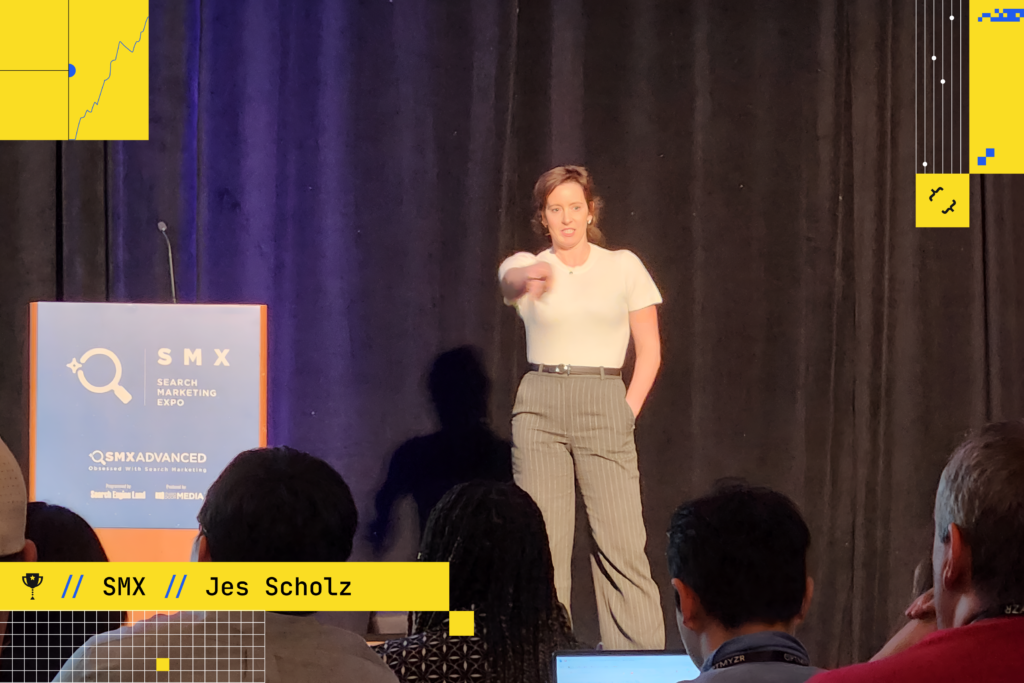
“This is not just about Google anymore. Your website is a small piece of a much larger indexing play.”
- Jes Scholz
Key Points
- The most common indexing issues fall into three categories:
- Poor SEO implementation: Canonical errors, 404 pages, and restrictive robots.txt files
- Low content quality: Thin, repetitive, or generic pages
- Processing problems: These cause pages to show up as “discovered, not indexed” or “crawled, not indexed”
- Not every indexing issue means a page is bad: Sometimes Google continues crawling to understand a page better. Jes recommended auditing and segmenting your site to uncover which pages are valuable and why they might be missing from the index. She also outlined technical submission options, including:
- Sitemaps: Submit separate ones for different page types
- Indexing API: Useful for job postings or time-sensitive content
- Bing IndexNow: Performance varies and should not be relied on blindly
- Manual submission: Limited to 10 URLs per day via Google Search Console
- News sitemaps: Work best for fresh content published within 48 hours
- Internal linking plays a major role: A solid internal architecture with breadcrumbs, pagination, and homepage links to high-priority pages can boost crawlability and indexing. External links help but they are harder to scale.
The key is alignment across different indexing methods. When your strategies are in sync, the benefits compound. Your site is no longer the central destination but one piece of a much larger indexing network.
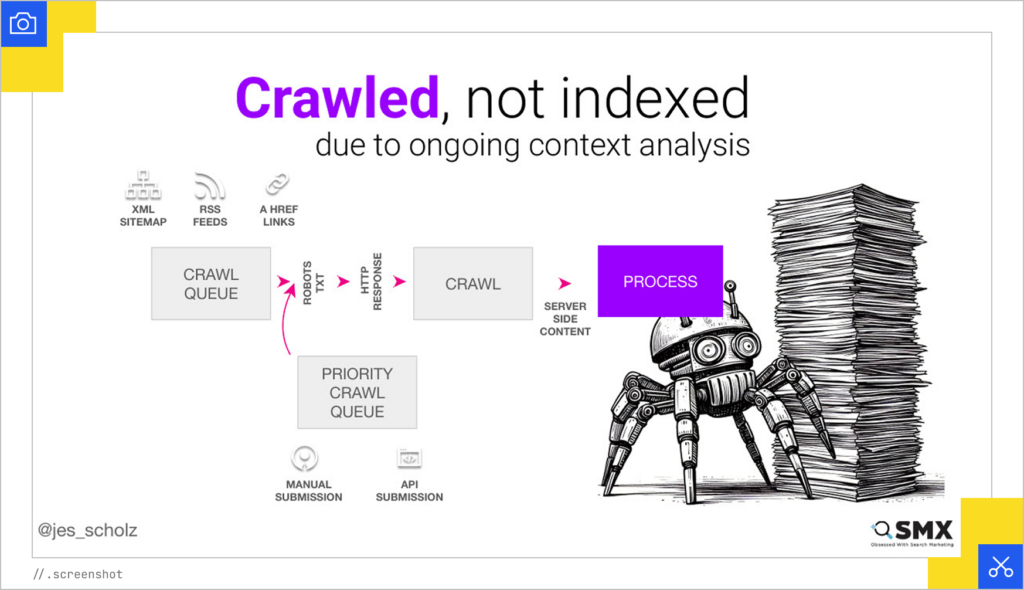
Information Retrieval
Dawn Anderson, Managing Director at Bertey, said we are in the middle of the biggest shift in information retrieval in 70 years (information science as we know it has been around since just after World War II). In her presentation, “From Search Ranking to Answer Synthesis: How to Weather the AI Storm,” she described Google’s approach to generative information retrieval as a “rush job,” suggesting the tech is evolving faster than the systems around it can adapt.
We know that people are drawn to tools that make search effortless (those Delphic costs, remember?), but what Google is doing now isn’t evolution. Dawn referenced Ricardo Baeza-Yates who said it’s involution, meaning it’s a process of folding in on itself instead of advancing outward. Dawn warned that the current trajectory could lead to an endangered information ecosystem.

“We must be forward thinking.”
- Dawn Anderson
Key Points
- AI-generated search results often sound convincing, even when they are wrong: This makes them more dangerous than obviously flawed content. Dawn emphasized the need to ensure information quality keeps pace with technological change.
- Closed-book and open-book information retrieval: Closed-book systems pull entirely from within the model’s training data. Open-book systems, like the Retrieval-Augmented Generation (RAG) methods we see in use today, combine the model’s output with external sources for grounding. This demands content that supports relevance and factual grounding:
- Clear topic chunking for long-form content.
- Strong semantic structure and headings.
- Consistency in language and clustering.
- No ambiguity in topics.
- Minimal reliance on client-side JavaScript.
- The best defense is not technical workarounds but smart strategy: The necessity of llms.txt, which attempts to signal LLM crawling permissions, is still under debate.
- Good SEO practices still apply: Know your audiences and personas. Create consistent, focused, well-structured content across all touchpoints. Google’s new retrieval systems are shaped in part by the memory of your past searches, so consistency and user context is important.
This is not the end of classic information retrieval. It’s a shift, not a replacement. The key is to evolve with the systems, not against them.
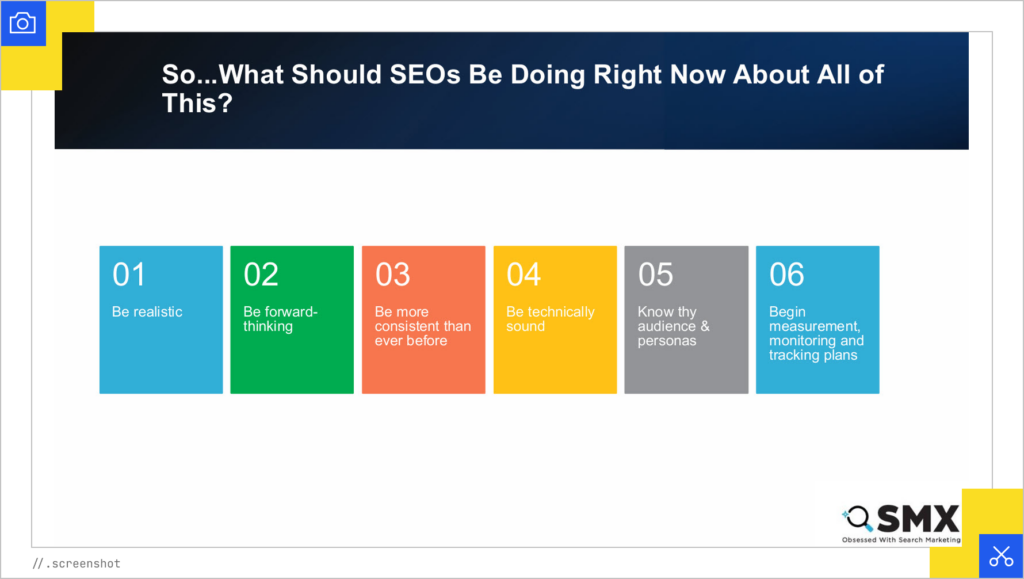
Crystal Carter, Head of SEO Communications at Wix, led the crowd through a rapid-fire overview of what reasoning models are really looking for in her presentation, “The Deep Search Shift: Optimizing for LLM Reasoning Models.” AI isn’t just retrieving content but thinking through it.
We’ve entered the era of deep search, where LLMs are evaluating, inferring, and citing sources based on logical reasoning and expertise. Mixture of Experts (MoE) is redefining what qualifies as quality content. AI is building its knowledge from webpages that it sees as experts, so your content can become part of an LLM’s internal reasoning process.
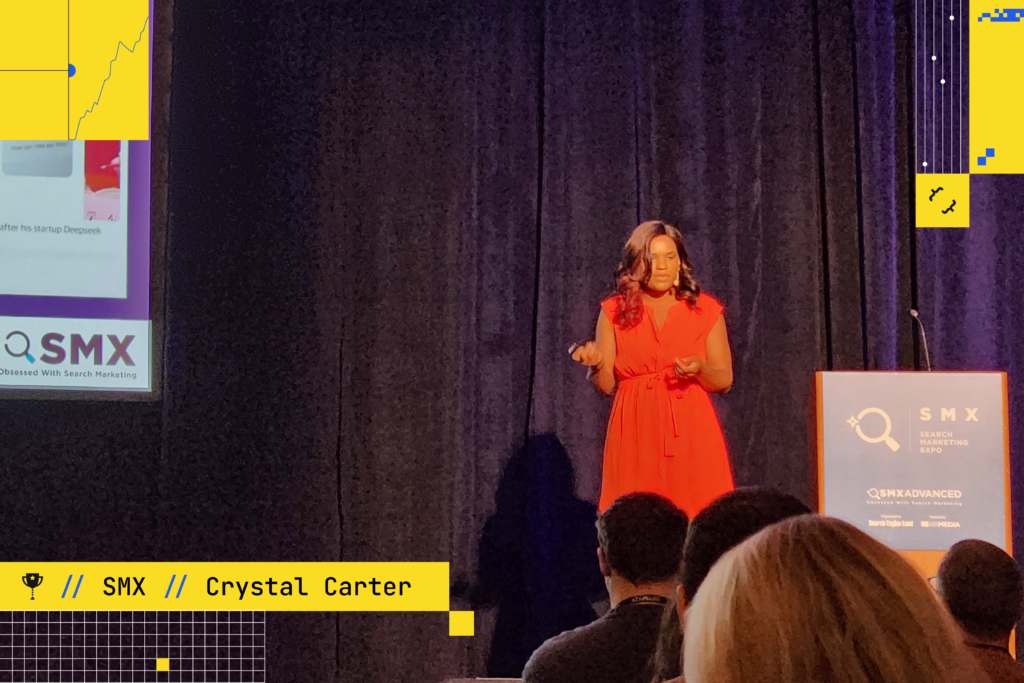
“Own your expertise. Reasoning models want to surface your brand content.”
- Crystal Carter
Key Points
- There are core types of LLM experts: Those that know something focus on topics like medicine, sports, and law, and those that do something perform actions like translation, math, and coding.
- If you want your content cited, you need to own your expertise: Show up where LLMs are looking. That means publishing nuanced, authoritative, well-structured content across relevant domains and subdomains.
- Optimize for query fan-out and citations in LLMs:
- Treat each query as a keyword.
- Study the user journey for core terms to map content needs.
- Cover topics with nuance on the most relevant domain or subdomain.
- Embrace current events.
- Have an opinion.
- Optimize your videos.
- Own your expertise.
Reasoning models draw from user-generated content and social signals, so Crystal encouraged everyone to be active on social media with purposeful, aligned messaging and to build brand presence across more than just your main site.
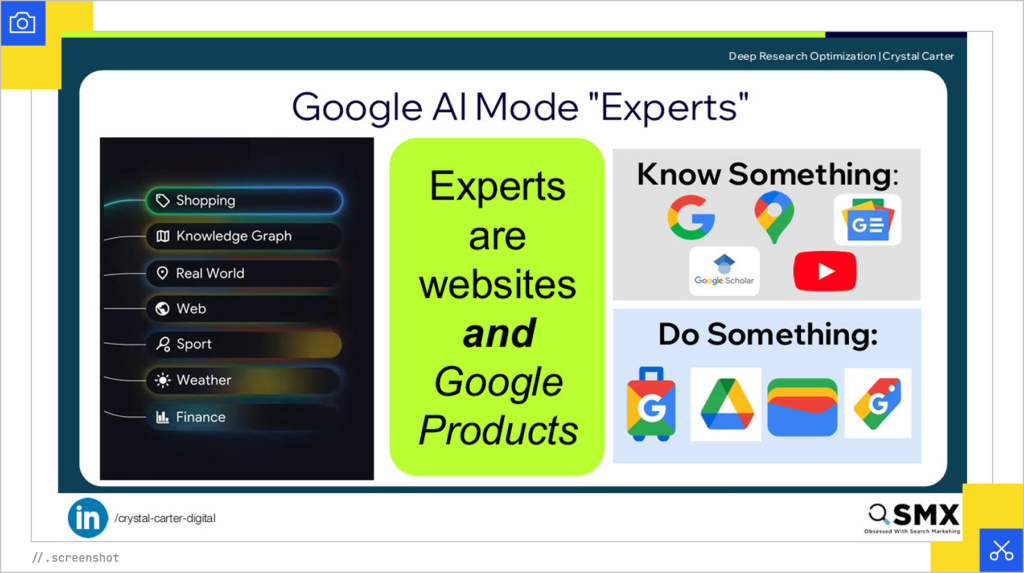
Artificial Intelligence
Bart Goralewicz, Co-founder of Ziptie.dev, reminded us all that rankings no longer guarantee clicks. In his presentation, “The Search Evolution: Preparing for AI-first Discovery,” he discussed our entrance into the zero-click era, where users increasingly get their answers directly in the search results.
Over half of all internet traffic isn’t even human anymore. And with Reddit showing up in the majority of Google searches, there is a new search paradigm. Although Bart openly disagreed with Mike’s Relevance Engineering model during his presentation, he still had some great insights to share so I can forgive him for that (this time).
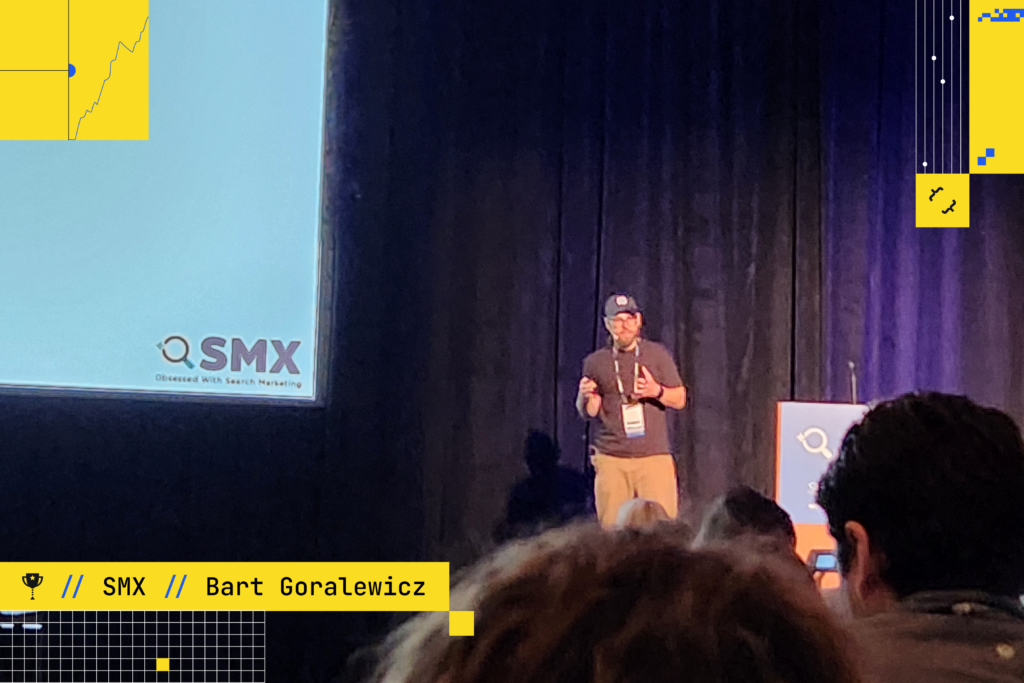
“Understanding your audience is the new link building.”
- Bart Goralewicz
Key Points
- Search engines have changed their purpose: They’re no longer built to drive users to websites. Instead, they are optimized to answer questions at different stages of the user journey. This shift demands a different mindset.
- We should stop relying solely on traditional SEO metrics: They often miss the real context behind user behavior. SEO still matters, but it’s more about understanding now. To stay relevant, brands need to:
- Speak the actual language of their buyers.
- Address the real problems users are trying to solve.
- Close the trust gap that’s widened because websites push too much sponsored content.
- Reddit’s raw, unfiltered discussions have filled the trust void and captured attention: Unlike a traditional query like “best vacuums of 2025,” which many people probably are not searching for, users on Reddit ask specific, nuanced, personal questions like, “why is it bad to use a Dyson on a wool carpet?” Then the Reddit thread becomes the query itself.
- Brands should map user questions across multiple stages: Answers from one moment in the journey inform the next. The goal is not just to provide answers, but to become part of the conversation.
At the heart of it all is context, or the problem that led the user to search in the first place. Brands that understand this will outperform those that just chase rankings.
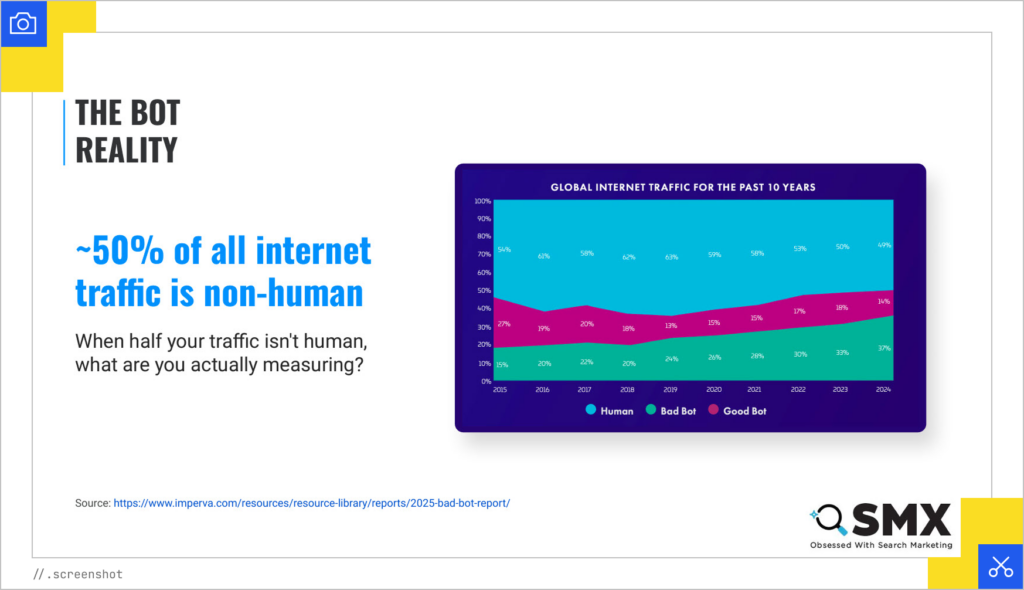
Dave Davies, Head of SEO at Weights & Biases, sees the future and it’s full of agents. Not the ones from The Matrix (not yet, anyway) but rather software systems that use AI to pursue goals and complete tasks on behalf of users. In his presentation, “Agents of Change: SEO in the Era of Agentic AI,” he discussed how agents have reasoning, planning, memory and a level of autonomy to make decisions, learn and adapt. And we will soon be optimizing for them instead of human users.
In my favorite analogy of the day, he described it like an ant colony where the foragers have a goal to collect food, getting orders from the queen and coordinating with warriors. Then they have to adapt to accomplish their goal (such as finding something that’s too big for just one ant to carry).
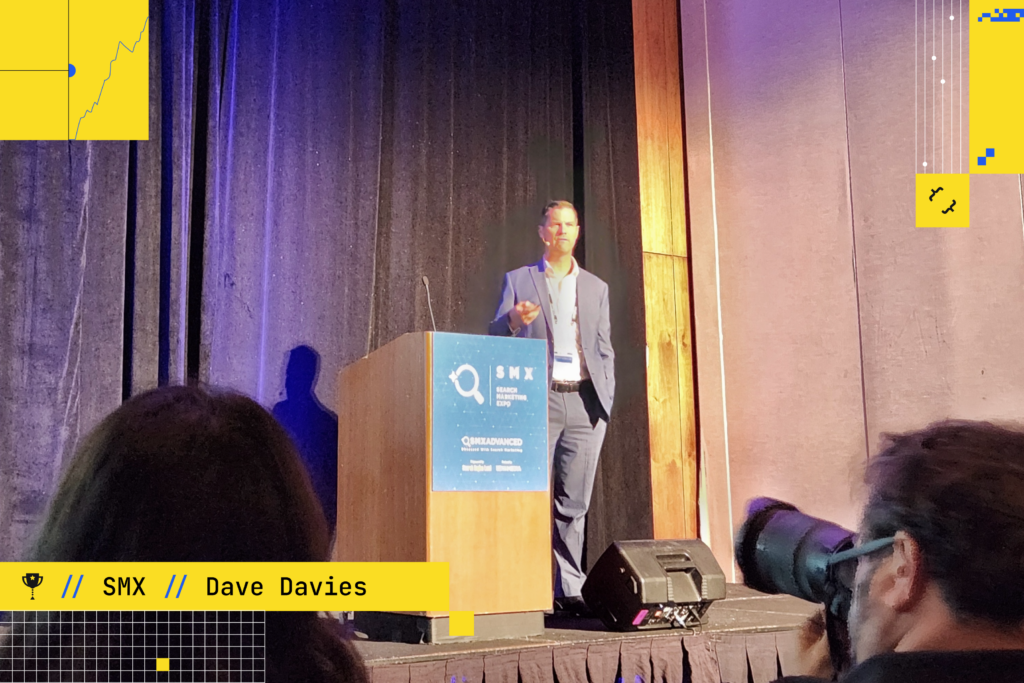
“If you think the last two years have been disruptive in your traffic patterns, buckle up.”
- Dave Davies
Key Points
- If you’re still optimizing your site for human users, you might already be behind: Agentic traffic will soon eclipse the impact of generative search results, reshaping who (or what) we’re optimizing for. Imagine waking up to find an AI agent has already planned your day, ordered your lunch, and helped you buy a new pair of shoes. It’s coming.
- Google is rapidly embedding agents into the devices and platforms we use every day: From Gemini in TVs to smart glasses that see and hear your world, agents are being trained to understand your behavior and anticipate your needs. Dave shared a vision of a not-so-distant future where each person has a persistent Google-assigned agent that quietly makes decisions behind the scenes.
- The future of interaction is shifting from searching and clicking to asking and receiving: That means marketers must adapt to:
- Zero-click transactions
- Product feeds integrated with payment systems
- Brand optimization for journeys that never reach your website
- With agentic systems in play, it’s like running up an avalanche (another great analogy from Dave): The terrain is changing under your feet, and speed alone won’t save you. Brands will need to:
- Understand how popular agents operate in their category or region
- Optimize for systems, not just users
- Train their data to be machine-consumable
This isn’t the moment to wait and watch. We need to be evolving. The era of optimizing for people is phasing out. We’re entering the era of optimizing for their digital proxies.
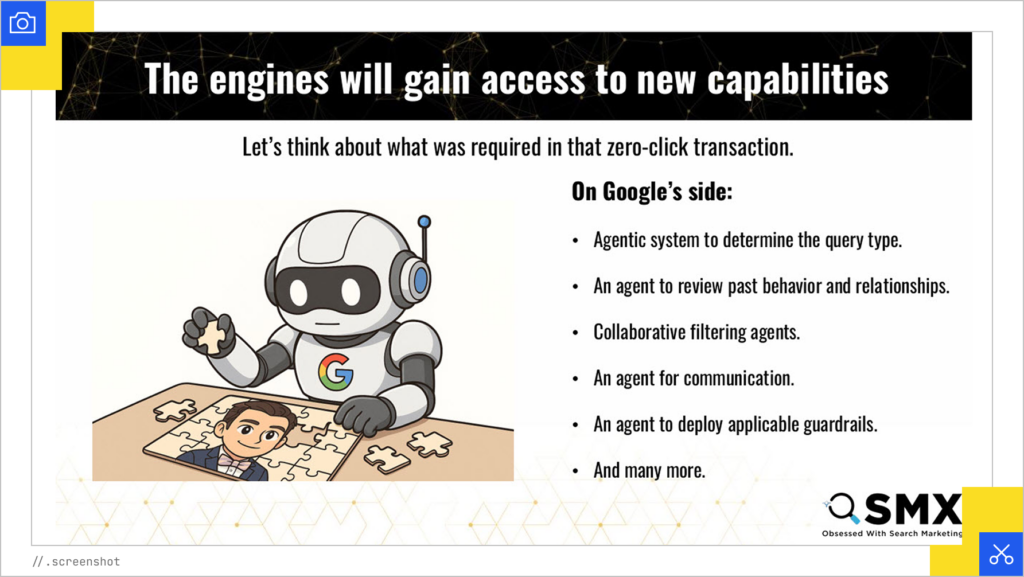
Kelsey Libert, Co-Founder of Fractl, said you can’t kill SEO in her presentation, “How AI is Reshaping SEO: Challenges, Opportunities, and Brand Strategies for 2025.” Search is a behavior, not a platform, and AI is simply a new channel to which we should adapt. This is not an extinction event.
Kelsey’s talk was full of great stats on the state of AI today. Overall, we must lean into the moment with content built around deep subject matter expertise. It’s about knowing where your audience spends time online and showing up with authority.
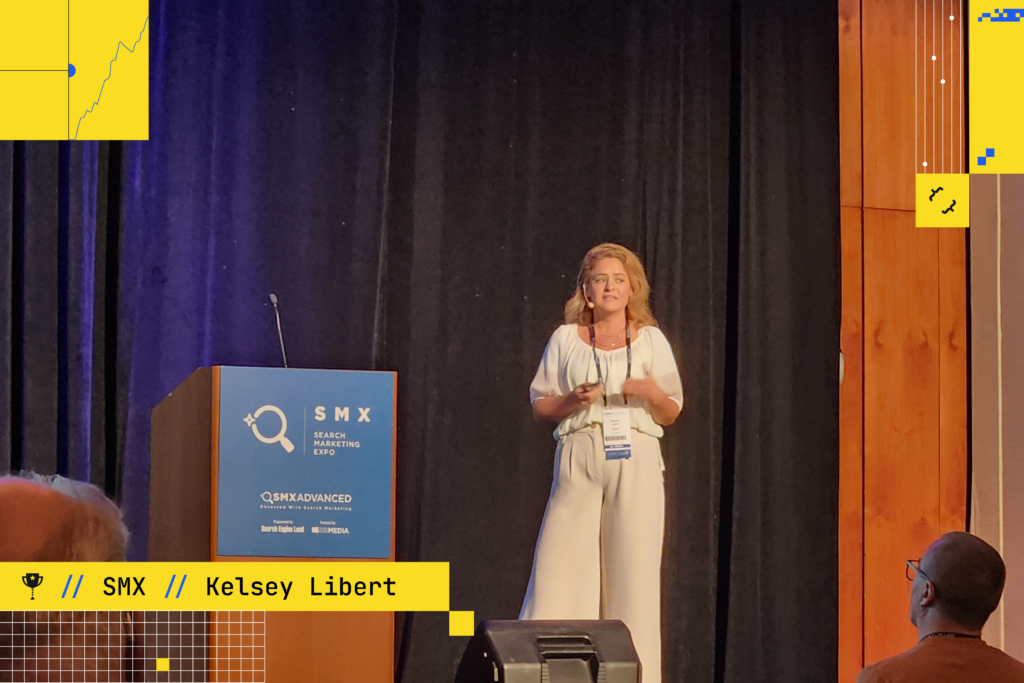
“Is AI going to kill organic search, or will it amplify brand messaging?”
- Kelsey Libert
Key Points
- Use AI for efficiency: Use it to draft high-volume copy, surface insights from massive data sets, and identify gaps at scale, and optimize on-page SEO.
- Very few companies are tracking LLMs: Just 22% are tracking their impact, but we need better tools to monitor content visibility, citation patterns, and audience signals across these new channels.
- Users are not as skeptical as we think: Over 80 percent have a neutral or positive view of brands using AI-generated content. But quality still matters. That’s where prompt engineering becomes an important skill to keep AI output accurate and actually useful.
- AI’s misinformation problem is serious: 78% of marketers and 68% of consumers are concerned about AI-driven misinformation more than they fear job loss. That makes trust, consistency, and clarity even more vital for any brand.
LLMs learn from what’s distributed and discoverable. If your brand is showing up across the right platforms, cited in multiple channels, and maintaining consistency, you have a much better shot at being part of the conversation.
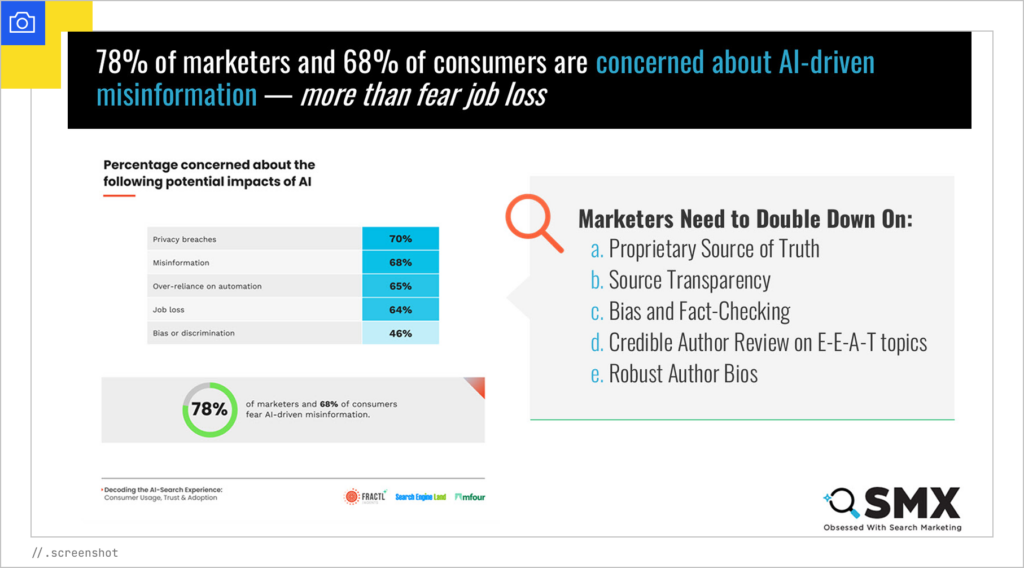
Will Scott, Co-Founder of Search Influence, started his talk with a stat that still amazes me: ChatGPT reached 100 million users in just two months, making it the fastest-growing consumer app in history. The content and structure of his presentation, “5 Key Insights for Mastering Generative Engine Optimization,” was even recommended by AI.
AI engines don’t crawl the web like Google does, and they’re not obligated to visit your site at all. If you want to be included in their answers, you need to make your content easy to parse, cite, and access.
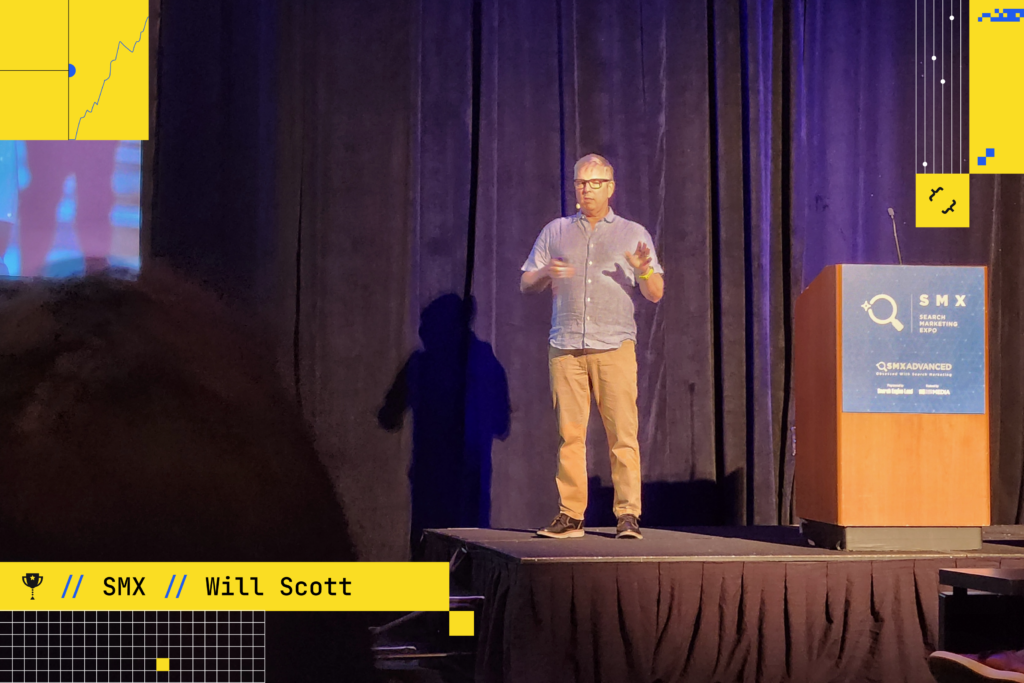
“If you continue to be the intelligence of the engine, then the outputs that you get are going to be that much better.”
- Will Scott
Key Points
- Google introduced the knowledge graph back in 2012: The idea of structured, question-driven content isn’t new, but it’s more important now than ever. Focused sections and clean page architecture give users and AI engines what they’re looking for: quick answers.
- Headings should be questions or topic-driven statements: That structure makes it easier for AI to identify and cite specific sections. Add in-page citations to reinforce authority, and your content becomes far more likely to be included in AI-generated answers.
- Render speed matters: If your page takes too long to serve the important content, AI systems may skip it entirely. Their crawl bandwidth is limited, and they’re not wasting it.
- Actions to take today:
- Choose one question and build a dedicated page for it.
- Add step-by-step labels to an existing post.
- Run a quick page speed test.
- Insert jump links into your longest guide.
- Add clear source notes to at least one article.
The goal is not to chase algorithms anymore, but to design for how answers are being delivered.
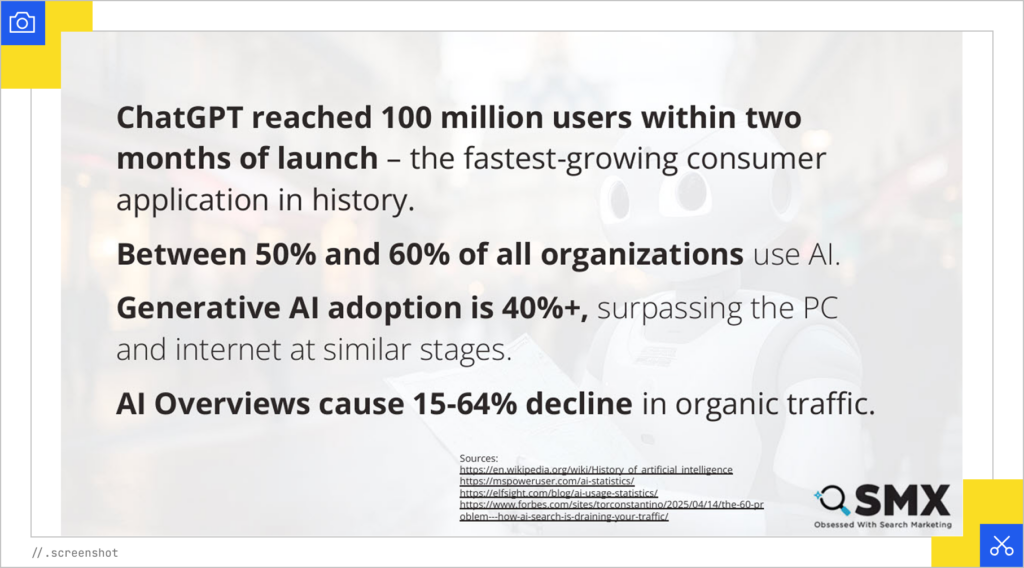
SMX Experts Showed the Future of SEO
SMX Advanced 2025 made one thing very clear: search is about understanding the system, aligning with your audience, and showing up with actual value. Whether it’s reasoning models chunking your content, agents making decisions without you, or a shrinking web full of noise, the message across every session was to adapt or disappear.
Relevance Engineering is clearly a survival skill for the future of search. It’s time to get strategic and get aligned. The web may be changing, but your responsibility to searchers remains the same. We don’t have to accept the deterioration of search.
In the words of Mike King: “The future is what we decide it is. We can do something different.”


